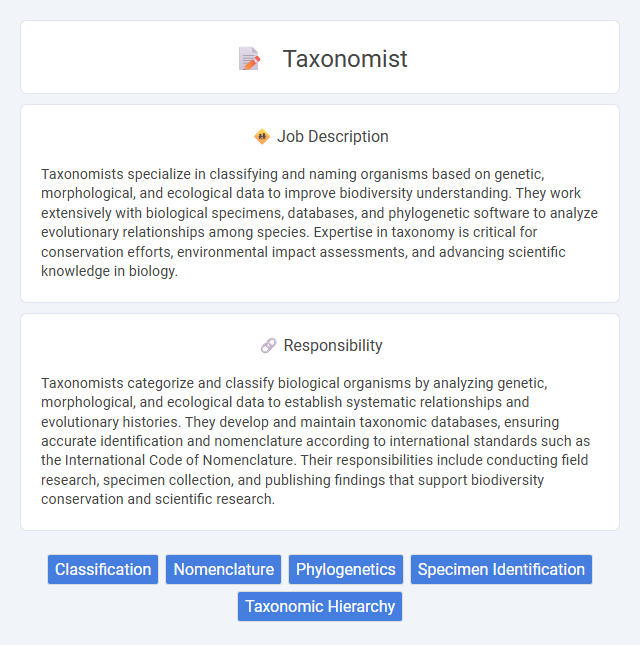
Taxonomists specialize in classifying and naming organisms based on genetic, morphological, and ecological data to improve biodiversity understanding. They work extensively with biological specimens, databases, and phylogenetic software to analyze evolutionary relationships among species. Expertise in taxonomy is critical for conservation efforts, environmental impact assessments, and advancing scientific knowledge in biology.
Individuals with a strong passion for biology and attention to detail are likely suitable for a career as a taxonomist, as the role involves classifying and identifying organisms based on their characteristics. People who enjoy research, pattern recognition, and working independently or in lab settings may find this job fulfilling and engaging. Those who lack patience for meticulous work or are uncomfortable with scientific analysis may struggle to thrive in this profession.
Qualification
Taxonomists typically require a bachelor's degree in biology, environmental science, or a related field, with many positions demanding a master's or Ph.D. specializing in taxonomy, systematics, or biodiversity. Proficiency in molecular techniques, bioinformatics tools, and knowledge of classification systems enhances employability. Experience with field research, specimen identification, and database management is highly valuable in advancing a career in taxonomy.
Responsibility
Taxonomists categorize and classify biological organisms by analyzing genetic, morphological, and ecological data to establish systematic relationships and evolutionary histories. They develop and maintain taxonomic databases, ensuring accurate identification and nomenclature according to international standards such as the International Code of Nomenclature. Their responsibilities include conducting field research, specimen collection, and publishing findings that support biodiversity conservation and scientific research.
Benefit
A career as a taxonomist likely offers opportunities to contribute to scientific understanding and biodiversity conservation, which can provide a strong sense of professional fulfillment. There is potential for collaboration with research institutions, museums, and environmental organizations that may enhance job stability and growth. The role may also involve access to fieldwork and cutting-edge technology, promoting continuous learning and skill development.
Challenge
Taxonomist roles likely involve the complex challenge of accurately classifying and categorizing vast amounts of biological data, often requiring deep expertise in both traditional methods and modern technologies. The job may demand continuous adaptation to new scientific discoveries and evolving classification systems, creating an environment of ongoing learning and problem-solving. Navigating ambiguous or incomplete data could frequently complicate decision-making processes for taxonomists.
Career Advancement
Taxonomists specializing in biological classification can advance their careers by gaining expertise in molecular techniques and data analytics to enhance species identification accuracy. Pursuing higher degrees such as a master's or PhD in taxonomy or systematics significantly boosts prospects for research and academic positions. Opportunities for career growth also include joining government agencies, museums, or environmental organizations where leadership roles in biodiversity projects often emerge.
Key Terms
Classification
Taxonomists specialize in the scientific classification of organisms, organizing species based on shared characteristics and genetic relationships. They analyze morphological, anatomical, and molecular data to develop hierarchical taxonomic systems that enhance biodiversity understanding. Their work supports conservation efforts, ecological research, and the accurate naming of species within biological databases.
Nomenclature
Taxonomists specializing in nomenclature ensure the accurate naming and classification of organisms according to international codes such as the ICZN and ICN. Their expertise involves resolving synonymies, homonyms, and ensuring the stability of taxon names to maintain scientific consistency. Precision in nomenclature supports biodiversity databases, ecological research, and conservation efforts worldwide.
Phylogenetics
Taxonomists specializing in phylogenetics analyze evolutionary relationships among species using genetic, morphological, and molecular data to construct accurate phylogenetic trees. They apply computational methods and bioinformatics tools to interpret lineage divergences and evolutionary patterns, enhancing biological classification systems. Their work supports biodiversity conservation, evolutionary biology research, and the discovery of new species through refined taxonomic frameworks.
Specimen Identification
Taxonomists specialize in specimen identification by analyzing morphological traits and genetic data to classify organisms accurately within the biological hierarchy. They utilize microscopy, molecular techniques, and reference databases to differentiate species, aiding biodiversity research and conservation efforts. Precise specimen identification ensures effective taxonomy, supporting ecological studies, environmental monitoring, and bioinformatics.
Taxonomic Hierarchy
A taxonomist specializes in the classification and naming of organisms, meticulously organizing species into a structured taxonomic hierarchy that includes ranks such as domain, kingdom, phylum, class, order, family, genus, and species. This hierarchical framework enables precise identification and evolutionary relationship mapping, essential for biodiversity studies and environmental conservation. Expertise in molecular phylogenetics and familiarity with databases like ITIS and NCBI Taxonomy further enhance a taxonomist's ability to refine and update classification systems accurately.
 kuljobs.com
kuljobs.com